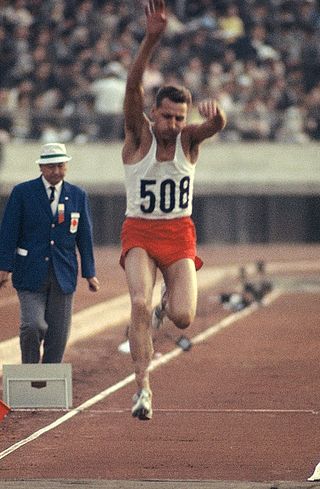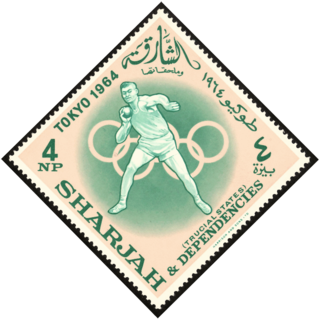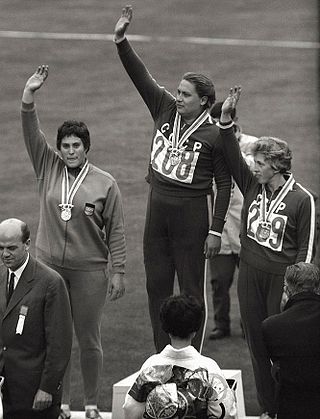
The men's long jump was one of four men's jumping events on the Athletics at the 1964 Summer Olympics program in Tokyo. It was held on 18 October 1964. 37 athletes from 23 nations entered, with 5 not starting in the qualification round. The maximum number of athletes per nation had been set at 3 since the 1930 Olympic Congress. The event was won by 4cm by Lynn Davies of Great Britain, breaking a string of eight straight American victories. It was Great Britain's first gold medal in the men's long jump, and first medal since 1900. It was only the second time the United States had not won the event, with Sweden's William Petersson in 1920 the only non-American to win before Davies. Ralph Boston of the United States and Igor Ter-Ovanesyan of the Soviet Union became the third and fourth men to win a second medal in the long jump.

The men's triple jump was one of four men's jumping events on the Athletics at the 1964 Summer Olympics program in Tokyo. It was held on 16 October 1964. 36 athletes from 23 nations entered, with 2 not starting in the qualification round. The maximum number of athletes per nation had been set at 3 since the 1930 Olympic Congress. The event was won by Józef Szmidt of Poland, the third man to repeat as Olympic champion in the triple jump. Just as in 1960, the Soviet Union took silver and bronze behind Szmidt.

The men's high jump was one of four men's jumping events on the Athletics at the 1964 Summer Olympics program in Tokyo. Qualification was held on October 20, 1964, with the final on October 21. 29 athletes from 20 nations entered, with 1 not starting in the qualification round. The maximum number of athletes per nation had been set at 3 since the 1930 Olympic Congress. The event was won by Valeriy Brumel of the Soviet Union, the nation's second consecutive victory in the men's high jump. Brumel, who had earned silver in 1960, and American John Thomas, who had previously taken bronze in 1960 and now won silver, became the first two men to win multiple medals in the Olympic high jump. John Rambo, also of the United States, won bronze to complete the podium.

The men's pole vault was one of four men's jumping events on the Athletics at the 1964 Summer Olympics program in Tokyo. Qualification was held on 15 October 1964, with the final on 17 October. 32 athletes from 20 nations entered, with 2 not starting in the qualification round. The final lasted over seven hours, to date the longest competition in history. All finalists qualified at 4.60, however in the final five were unable to achieve the height again.

The men's shot put was one of four men's throwing events on the Athletics at the 1964 Summer Olympics program in Tokyo. It was held on 17 October 1964. 25 athletes from 15 nations entered, with 3 not starting in the qualification round. The maximum number of athletes per nation had been set at 3 since the 1930 Olympic Congress. The event was won by Dallas Long of the United States, the nation's fifth consecutive and 13th overall victory in the men's shot put. His teammate Randy Matson took silver, making 1964 the fifth straight Games the Americans had finished one-two. A second consecutive sweep was prevented when Vilmos Varju of Hungary took third over American Parry O'Brien. Long was the sixth man to win two shot put medals ; Matson would later become the seventh. O'Brien's fourth place finish kept him from being the first man to win four—he had taken gold in 1952 and 1956 and silver in 1960.

The men's discus throw was one of four men's throwing events on the Athletics at the 1964 Summer Olympics program in Tokyo. It was held on 15 October 1964. 29 athletes from 21 nations entered, with 1 additional athlete not starting in the qualification round. The maximum number of athletes per nation had been set at 3 since the 1930 Olympic Congress. The event was won by Al Oerter of the United States, the nation's fourth consecutive and 11th overall victory in the men's discus throw. Oerter became the first man to win three medals in the event, all of them gold. He was only the second person to win three consecutive gold medals in any individual athletics event. It was the third of his four consecutive wins in the event. Ludvik Danek of Czechoslovakia took silver to break up the Americans' two-Games dominance of the discus podium; no non-American had won a medal since 1952. Dave Weill earned bronze to make this the fourth straight Games that the United States had won at least two medals in the event.

The men's javelin throw was one of four men's throwing events on the Athletics at the 1964 Summer Olympics program in Tokyo. It was held on 14 October 1964. 27 athletes from 17 nations entered, with 2 not starting in the qualification round.

The men's hammer throw was one of four men's throwing events on the Athletics at the 1964 Summer Olympics program in Tokyo. It was held on 17 October and 18 October 1964, with the qualification on the first day and the final the next. 25 athletes from 14 nations entered, with 1 not starting in the qualification round. The maximum number of athletes per nation had been set at 3 since the 1930 Olympic Congress. The event was won by Romuald Klim of the Soviet Union, the nation's second consecutive victory in the men's hammer throw. Gyula Zsivótzky of Hungary repeated as silver medalist, the fifth man to win multiple medals in the event. Uwe Beyer took bronze, the first medal for the United Team of Germany and the first medal for any German hammer thrower since 1952.

The women's shot put was one of three women's throwing events on the Athletics at the 1964 Summer Olympics program in Tokyo. It was held on 20 October 1964. 17 athletes from 12 nations entered, with 1 not starting the qualification round.

The women's discus throw was one of three women's throwing events on the Athletics at the 1964 Summer Olympics program in Tokyo. It was held on 19 October 1964. 22 athletes from 15 nations entered, with 1 not starting in the qualification round.

The men's shot put event was part of the track and field athletics programme at the 1952 Summer Olympics in Helsinki, Finland. Twenty athletes from 14 nations competed. The maximum number of athletes per nation had been set at 3 since the 1930 Olympic Congress. The competition was held on 21 July at Helsinki Olympic Stadium. The finals were swept by the United States, with Americans Parry O'Brien taking the gold medal, Darrow Hooper earning silver and Jim Fuchs receiving his second consecutive bronze medal in the event. It was the 10th victory for an American in the event, and the fifth medal sweep for the United States. Fuchs was the third man to win multiple medals in the shot put.
The Women's javelin throw competition at the 2012 Summer Olympics in London, United Kingdom. The event was held at the Olympic Stadium on 7–9 August. Each athlete receives three throws in the qualifying round. All who achieve the qualifying distance progress to the final. If less than twelve athletes achieve this mark, then the twelve furthest throwing athletes reach the final. Each finalist is allowed three throws in last round, with the top eight athletes after that point being given three further attempts.

The Men's javelin throw competition at the 2012 Summer Olympics in London, United Kingdom. The event was held at the Olympic Stadium on 8–11 August.
The women's javelin throw at the 2017 World Championships in Athletics was held at the Olympic Stadium on 6 and 8 August.

The men's shot put event at the 2020 Summer Olympics took place between 3 and 5 August 2021 at the Japan National Stadium. Thirty-one athletes from 22 nations competed. For the first time in Olympic history, the same three competitors received the same medals in back-to-back editions of an individual event. Americans Ryan Crouser and Joe Kovacs and New Zealander Tom Walsh repeated their gold, silver, and bronze (respectively) performances from the 2016 Summer Olympics. They became the 15th, 16th, and 17th men to earn multiple medals in the shot put; Crouser was the 4th to repeat as champion.

The women's shot put event at the 2020 Summer Olympics took place on 30 July and 1 August 2021 at the Japan National Stadium. Approximately 35 athletes are expected to compete; the exact number will depend on how many nations use universality places to enter athletes in addition to the 32 qualifying through distance or ranking.

The women's discus throw event at the 2020 Summer Olympics took place on 31 July and 2 August 2021 at the Japan National Stadium, with 31 athletes competing.

The women's hammer throw event at the 2020 Summer Olympics took place on 1 and 3 August 2021 at the Japan National Stadium. Approximately 35 athletes competed; the exact number was dependent on how many nations use universality places to enter athletes in addition to the 32 qualifying through distance or ranking.

The men's javelin throw event at the 2020 Summer Olympics took place on 4 and 7 August 2021 at the Japan National Stadium. Approximately 35 athletes competed; the exact number depended on how many nations use universality places to enter athletes in addition to the 32 qualifying through distance or ranking.

The women's javelin throw event at the 2020 Summer Olympics took place on 3 and 6 August 2021 at the Japan National Stadium. Approximately 35 athletes competed; the exact number was dependent on how many nations use universality places to enter athletes in addition to the 32 qualifying through distance or ranking.












